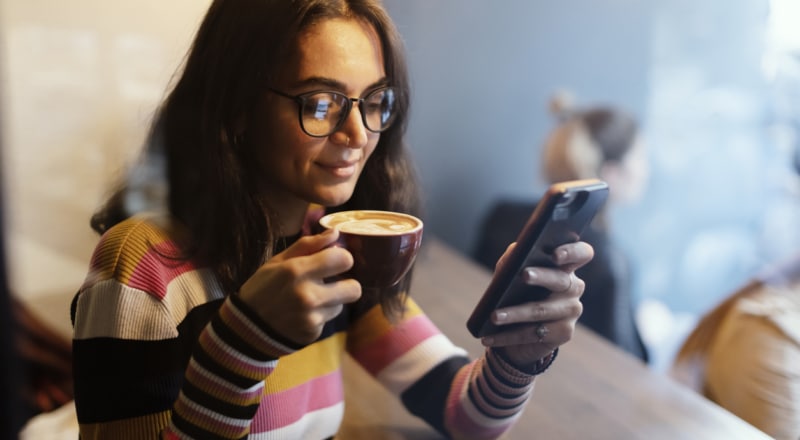Why it’s important to look at the positives of social media
Isabel talks about the positive aspects of Instagram and how it can bring communities together

Self-esteem is a word that gets thrown around a lot, but what exactly does it mean? Self-esteem is your own evaluation of your worth as a person. This does not mean your talents and abilities, or even how you are seen by others. It describes the negative or positive attitude you have of yourself. It’s influenced by a number of factors. In childhood your parents play a crucial role. During adolescence your peers, school and society play a bigger role.
The not so dark side of Instagram
Instagram is often demonised as being the worst social network for young people’s self-esteem and mental health because of the pressure to conform, FOMO, its addictive qualities, bullying and the easy comparison with friends, celebrities and influencers. People argue that the image-focused app could be driving feelings of anxiety and inadequacy among young people.
I believe there are many positive aspects to Instagram which are important to highlight. They show we cannot paint all of Instagram with the same brush and that there are elements of Instagram which are fighting back against the potentially harmful parts of Instagram.
The Body Positivity Movement
The body positivity or #bopo movement is about encouraging people to accept their bodies no matter their size, instead of falling into the trap of self-loathing. The actress Jameela Jamil is at the forefront of this campaign and started the movement “I weigh” which focuses on showing who a woman is without taking her weight into account.
Awareness around the harm of diet culture and fatphobia, and the need for diversity and representation in adverts stems from this movement. “Accomplishments like brands banishing Photoshop, TV shows casting a wider range of body types, and magazines vowing to stop splashing weight-loss promises on their front covers are small changes in the grand scheme of things, but hopefully are also signs of bigger changes to come,” say body positive blogger Megan Jane Crabbe.
A spin-off is #selflove. Body-positivity was created for marginalised bodies to feel more permitted to engage in self-love which was previously reserved for the privileged i.e. thin white bodies.
Disability Inclusion
#Spoonie has been used over 1 million times and refers to any individual who suffers from a chronic illness. Whether it be a physical disability, a chronic or mental illness, those affected often feel alone and Instagram is a way of reaching out and feeling less alone. By seeing what others are going through, we can feel less isolated and less alone. We are surrounded by thousands if not hundreds of thousands or even millions of others who may be going through something similar.
People with disabilities can face uncountable barriers and challenges as well as assaults on their self-esteem from negative societal attitudes. Finding a community of people on Instagram can be powerful and provide support, encouragement and friendship for people. It’s an important way to connect with others. Often the conversation around Instagram can be ableist without considering the fact that for some, Instagram can actually be a way of socialising and boosting self-esteem.
Peer Support
Instagram can be a safe space for many where they can express their feelings and be themselves. It gives people a chance to mutually support each other. For those who are not lucky enough to have a supportive family or friend environment, Instagram can give the support they desperately need. There are over 8 million photos with #mentalhealth on Instagram and over 17 million for #depression.
Online communities provide belonging which is an essential element of positive self-esteem. Being anonymous or able to use a fake name means young people can feel more comfortable discussing personal issues and the solidarity can make them feel less isolated.
My conclusion
It is easy to blame social media for low self-esteem but I think this is an oversimplification. For many young people Instagram is overall a positive force in their lives. Young people are facing increased exam pressure, the costs of going to university and unemployment. Adolescence is not what it used to be and not just because of social media.
I believe that Instagram is not the root cause of the very real and tangible unhappiness and low self-esteem of a worrying amount of generation Z. Low self-esteem and mental health problems existed for young people long before the advent of social media.
Today, partly as a result of social media, there is less taboo around mental health with people talking more openly about it and hence more people being diagnosed. In relation to body image and the rise in eating disorders, it is just as easy to compare yourself to people in real life and often this has more dramatic consequences than looking at photos of strangers on a screen. The benefits are rarely discussed as much as the dangers.
Instagram can allow us to find like-minded people especially for those who do not have the opportunity to socialise or are unable to. The question shouldn’t be whether to ban social media or not but how best to navigate it so that it does not have a negative effect on the self-esteem of young people. I don’t deny that social media adds to the pressure cooker of being a young person in the world of today but, it can simultaneously let some of the steam out.
This article was written by a SpunOut.ie volunteer. Check out our volunteering opportunities here and get in touch if you’re interested in getting involved.






